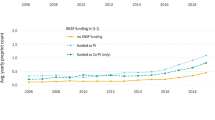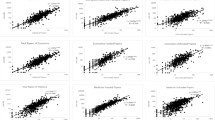Abstract
The strategy of judging the quality of scientific research by the level of funding it attracts is critically examined. It is argued that an indes such as per captita research income, which is based on grant-giver peer review, yields an unsatisfactory measure of scientific performance. It fails to fulfil a basic requirement of a performance indicator, namely, that it should relate outputs to inputs. It has intrinsically low validity, and is strongly confounced with a variety of extraneous factors that are unrelated to research performance.
Similar content being viewed by others
References
G. Bentham, An evaluation of the UGC's ratings of the research of British university geography departments,Area, 19 (1987) 147–154.
R. Gillett, Serious anomalies in the UGC comparative evaluation of the research performance of psychology departments,Bulletin of the British Psychological Society, 40 (1987), 42–49.
R. Gillett, The UGC evaluation: A rejoinder to Philip Levy,Bulletin of the British Psychological Society, 40 (1987) 361–364.
R. Gillett, A sampling artifact in the UGC evaluation of research performance,British Journal of Mathematical and Statistical Psychology, 42 (1989) 127–132.
R. Gillett, M. Aitkenhead, Rank injustice in academic research,Nature, 327 (1987) 381–382.
C.H. Lloyd, The research productivity of UK dental schools in the years 1980–85,Medical Science Research, 15 (1987) 349–353.
J. Platt, Research policy in British higher education and its sociological assumptions,Sociology, 22 (1988) 513–529.
D. Smith, UGC research ratings: pass or fail?Area, 18 (1986) 247–250.
University Grants Committee,A Strategy for Higher Education into the 1990s, HMSO, London, p. 5.
F.M. Lord, M.R. Novick,Statistical Theories of Mental Test Scores, Addison-Wesley, Reading, Massachusetts, 1968.
H.J. Enhorn, R.M. Hogarth, Confidence in judgement: Persistence of the illusion of validity,Psychological Review, 85 (1978) 395–416.
University Grants Committee,University Management Statistics and Performance Indicators, UGC, London, 1987.
Author information
Authors and Affiliations
Rights and permissions
About this article
Cite this article
Gillett, R. Pitfalls in assessing research performance by grant income. Scientometrics 22, 253–263 (1991). https://doi.org/10.1007/BF02020000
Received:
Issue Date:
DOI: https://doi.org/10.1007/BF02020000




